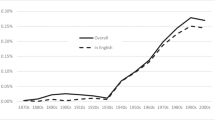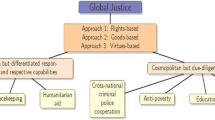Abstract
The same stubborn anomalies have plagued mainstream economics for multiple decades, despite available correction and amendment. We argue this perplexing situation has arisen because each anomaly, despite an apparent illogic, has practical utility as a rhetorical instrument of real world interests. Rhetorical instruments may elicit a set of behaviors desired of the believer that true theory would not. They may be strategically deployed whenever an actor in the real world wishes to elicit the behaviors in question of another actor. First, we show how the theoretical function of each anomaly may be explained from this perspective with standard economics theory. Then, we show how the whole of the theoretical and real discussion of anomaly in mainstream economics may be encompassed within a single framework, that of evolutionary multiple moralities. In practical life, economics divides asymmetrically into three moralities: A national economics, an imperial economics, and a slave economics. Mainstream economics—in prescribing a uniformly passive and concessionary agenda—fits the outward form of the last.
Similar content being viewed by others
References
Aldrich, H. E., G. M. Hodgson, D. L. Hull, T. Knudsen, J. Mokyr and V. Vanberg (2008) “In Defence of Generalized Darwinism,” Journal of Evolutionary Economics 18.5: 577–596.
Aristotle (1885) Politics, Vol. 1, B. Jowett (trans.), Clarendon Press, Oxford.
Ashley, W. J. (1907) “The Present Position of Political Economy,” The Economic Journal 17.68: 467–489.
Backhouse, R. E. (2010) The Puzzle of Modern Economics: Science or Ideology? Cambridge University Press, New York.
Becker, G. S. (1976) “Altruism, Egoism, and Genetic Fitness: Economics and Sociobiology,” Journal of Economic Literature 14.3: 817–826.
Beinhocker, E. D. (2006) The Origin of Wealth: Evolution, Complexity, and the Radical Remaking of Economics, Harvard Business School, Boston.
Ben-Porath, Y. (1967) “The Production of Human Capital and the Life Cycle of Earnings,” Journal of Political Economy 75.4 (Part 1), 352–365.
Camerer, C., G. Loewenstein and D. Prelec (2005) “Neuroeconomics: How Neuroscience Can Inform Economics,” Journal of Economic Literature 43.1: 9–64.
Carroll, W. and J. P. Sapinksi (2011) “Corporate Elites and Intercorporate Networks,” in J. Scott and P. Carrington (eds) The Sage Handbook of Social Network Analysis, Sage, Los Angeles, pp. 180–195.
Chari, V. V. and P. J. Kehoe (2004) “Financial Crises as Herds: Overturning the Critiques,” Journal of Economic Theory 119.1: 128–150.
Chen, P. (2008) “Equilibrium Illusion, Economic Complexity and Evolutionary Foundation in Economic Analysis,” Evolutionary and Institutional Economics Review 5.1: 81–127.
Conrad, A. H. and J. R. Meyer (1958) “The Economics of Slavery in the Ante Bellum South,” Journal of Political Economy 66.2: 95–130.
Corning, P. A. (2002) “Thermoeconomics—Beyond the Second Law,” Journal of Bioeconomics 4.1: 57–88.
Cosmides, L. and J. Tooby (1994) “Better than Rational: Evolutionary Psychology and the Invisible Hand,” The American Economic Review 84.2: 327–332.
Fisher, I. (1935) 100% Money, Aldelphi, New York.
Friedman, M. (1960) A Program for Monetary Stability, Fordham University Press, New York.
General Education Board (1913) Occasional Papers, General Education Board, New York.
Griffin, G. E. (1998) Creature from Jekyll Island: A Second Look at the Federal Reserve, 3rd ed., American Media, Westlake Village, CA.
Hamilton, W. (1964) “The Genetical Evolution of Social Behaviour, I,” Journal of Theoretical Biology 7.1: 1–16.
Henrich, J., R. Boyd, S. Bowles, C. Camerer, E. Fehr, H. Gintis, R. McElreath, M. Alvard, A. Barr, J. Ensminger, N. Smith Henrich, K. Hill, F. Gil-White, M. Gurven, F. W. Marlowe, J. Q. Patton and D. Tracer (2005) “‘Economic man’ in Cross-Cultural Perspective: Behavioral Experiments in 15 Small-Scale Societies,” The Behavioral and Brain Sciences 28.6: 795–855, discussion 815–855.
Hirshleifer, J. (1993) “The Dark Side of the Force,” UCLA Department of Economics Working Paper #702, http://www.econ.ucla.edu/workingpapers/wp702.pdf (Accessed September 12, 2012).
Hirshleifer, J. (1977) “Economics from a Biological Viewpoint,” The Journal of Law & Economics 20.1: 1–52.
Hobson, J. A. (1902) Imperialism: A Study, James Pott, New York.
Hodgson, G. M. (2002) “Darwinism in Economics: From Analogy to Ontology,” Journal of Evolutionary Economics 12.3: 259–281.
Hodgson, G. M. (2007) “Evolutionary and Institutional Economics as the New Main-stream?” Evolutionary and Institutional Economics Review 4.1: 7–25.
Hodgson, G. M. (2011) “Sickonomics: Diagnoses and Remedies,” Review of Social Economy 69.3: 357–376.
Hodgson, G. M. and H. Rothman (1999) “The Editors and Authors of Economics Journals: A Case of Institutional Oligopoly?” Economic Journal 109.453: F165–F186.
Hodgson, G. M. (2012) “Toward an Evolutionary and Moral Science: Remarks upon Receipt of the Veblen-Commons Award,” Journal of Economic Issues 46.2: 265–275.
Jevons, W. S. (1888) The Theory of Political Economy, 3rd ed., Macmillan, London.
Keen, S. (2011) Debunking Economics: The Naked Emperor Dethroned?, 2nd ed., Zed Books, London.
Lawson, T. (2005) “The (Confused) State of Equilibrium Analysis in Modern Economics: An Explanation,” Journal of Post Keynesian Economics 27.3: 423–444.
Leijonhufvud, A. (1968) On Keynesian Economics and the Economics of Keynes: A Study in Monetary Theory, Oxford University Press, New York.
List, F. (1904 [1841]) National System of Political Economy, S. S. Lloyd (trans.), Longmans, Green, and Co., New York.
Marshall, A. (1903) New Cambridge Curriculum in Economics, MacMillan, New York.
Marshall, A. (1920) Principles of Economics, 8th ed., Macmillan, London.
Mira, M. and G. Liu (2010) “The OECD Human Capital Project: Progress Report,” http://www.iariw.org/papers/2010/5Mira.pdf (Accessed October 15, 2012).
Nishibe, M. (2006) “Redefining Evolutionary Economics,” Evolutionary and Institutional Economics Review 3.1: 3–25.
Parente, S. L. and E. C. Prescott (1994) “Barriers to Technology Adoption and Development,” Journal of Political Economy CII.2: 298–321.
Quigley, C. (1966) Tragedy and Hope: A History of the World in Our Time, Macmillan, New York.
Rabin, M. (1998) “Psychology and Economics,” Journal of Economic Literature 36: 11–46.
Roberts, P. C. (2013) The Failure of Laissez Faire Capitalism and Economic Dissolution of the West: Towards a New Economics for a Full World, Atwell Publishing, Amazon Digital Services (Kindle Edition).
Romer, P. M. (1990a) “Endogenous Technological Change,” Journal of Political Economy 98.5: S71–S102.
Romer, P. M. (1990b) “Capital, Labor, and Productivity,” Brookings Papers on Economic Activity, Microeconomics 1990: 337–367.
Shiozawa, Y. (2004) “Evolutionary Economics in the 21st Century: A Manifesto,” Evolutionary and Institutional Economics Review 3.2: 5–47.
Stanworth, P. and A. Giddens (1975) “The Modern Corporate Economy: Interlocking Directorships in Britain, 1906–1970,” The Sociological Review 23.1: 5–28.
Starobin, R. S. (1970) “The Economics of Industrial Slavery in the Old South,” Business History Review 44.2: 131–174.
Stoelhorst, J. W. (2008) “Darwinian Foundations for Evolutionary Economics,” Journal of Economic Issues 42.2: 415–423.
Tarbell, I. (1904) History of the Standard Oil Company, Vols. 1 and 2, McClure, Philips, and Co., New York.
Temin, P. (2006) “The Economy of the Early Roman Empire,” The Journal of Economic Perspectives 20.1: 133–151.
van den Bergh, J. C. (2009) “The GDP Paradox,” Journal of Economic Psychology 30.2: 117–135.
Veblen, T. (1898) “Why is Economics Not an Evolutionary Science?” The Quarterly Journal of Economics 12.4: 373–397.
Weber, M. (1930) The Protestant Ethic and the Spirit of Capitalism, T. Parsons (trans.), Butler and Tanner, London.
Witt, U. (1999) “Bioeconomics as Economics from a Darwinian Perspective,” Journal of Bioeconomics 1.1: 19–34.
Witt, U. (2006) “Evolutionary Economics and Psychology,” Papers on Economics and Evolution No. 0613, http://www.uni-graz.at/schumpeter.centre/download/witt_2.pdf (Accessed August 1, 2012).
Witt, U. (2008) “What is Specific about Evolutionary Economics?” Journal of Evolutionary Economics 18.5: 547–575.
Author information
Authors and Affiliations
Corresponding author
About this article
Cite this article
Jiang, Z., Bao, L. & Liu, H. Is Mainstream Economics a Slave Morality?: An Analysis of the Longstanding Anomalies of Mainstream Economics within the Evolutionary Framework of Multiple Moralities. Evolut Inst Econ Rev 10, 107–129 (2013). https://doi.org/10.14441/eier.A2013007
Published:
Issue Date:
DOI: https://doi.org/10.14441/eier.A2013007




